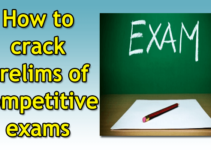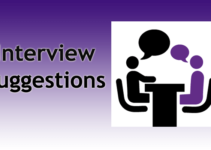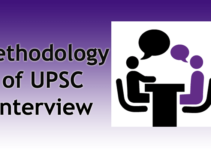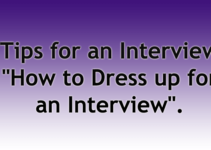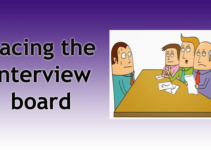Some Don’ts
First impression is the last impression. In this chapter, we intend to give some practical instructions to the candidates appearing for interview before a selection board. The authors have long and varied experience in having contacts with interviewees of all kinds. They feel justified in sounding a note of warning against the deplorable common habit of the interviewees who hang about the Interview Room in the hope of augmenting the confidence they lack and which can never be suddenly generated. This applies to any type of interview.
It is also unwise and tactless to discuss the interview with other interviewees. The author’s advice is: “Never do it!”
Many students are in the habit of trying to elicit information about the interview from the candidate who has just come out. This is a wrong habit. Those who resort to this become confused and remain muddle-headed till the last moment. They lose confidence in themselves and become nervous before facing the Selection Board. It is, therefore, advisable that interviewees should not try to exchange notes with other candidates before the interview.
1. Don’t Bluff
It is always wrong to bluff. The interviewee should never forget that the members of the Interview Board are well-read, accomplished and experienced persons and they seldom make a mistake in judging the real merit of a candidate. It is, therefore, suggested that the interviewee should be as frank, truthful and honest as possible. A smart personality accounts for nothing if it is unaccompanied with genuine confidence, truthfulness and frank admission of one’s ignorance if needed.
It is always right to admit one’s ignorance and not start making wild guesses. While appearing for a business Interview, the candidate must know something about the firm in which he is seeking a job, If the interviewee is unable to answer any question that is put to him, he will find himself in a very embarrassing situation. No possible advantage can accrue at any interview if the candidate or the interviewee knows nothing about anything. A business executive may interview a commercial representative and also discover that he knows nothing about his own firm, the nature of its ware, not even the extent to which order can be accepted. This data must always be prepared in advance of the interview. Similarly, a candidate for a railway post must know the ordinary rules and timing of trains which he might be expected normally to be familiar with. He must not answer if asked, “What is the most direct route from Chennai to Amritsar?” as follows: if I have the misfortune to go from Chennai to Amritsar, I shall consult the railway time table,” The reader may be quite sure that if he gives an answer like this, he will be passed over at once to the next candidate by members of the Interview Board and that will be end for him.
2. Don’t Flatter
Flattery is a fine art, but very few people know how to tickle the fancy of another person successfully. In most cases, a flatterer embarrasses, or even irritates, the other person.
This serves to show that while the interviewers are certainly human being, they do most definitely discourage pleasantries and dislike any attempt at familiarity or flattery. When a candidate indulges in this sort of thing, the interviewer may soon sum up his personal character and reject him forthwith, despite his other qualifications.
To cite the case of a candidate at an interview for a post in the Navy who was asked to name six greatest Admirals in English history. The Chairman of this Board was a distinguished naval officer, so with great adroitness, but with uncommendable tact, the candidate named Drake, Raleigh, Blake, Nelson, Collingwood and then paused, “Would you give me the name of the Chairman of this Board ?” he asked ingratiatingly, and explained: “Because he is the sixth.”
3. Don’t Speak Very Fast
Interviewees are advised not to speak very fast in the course of an Interview, Every word must be well-pronounced and distinctly spoken.
The use of slangs should be completely avoided. Sentences should be brief and concise.
(a) Carefully consider the setting and the manner of starting the first sentence, If the speaker starts well, he will naturally continue well,
(b) Use plain and simple words. By doing this, one will avoid error in pronunciation.
(c) Imperfect quotations lead to confusion in speech; the hesitation involved sets up linguistic handicaps. In other words, where there is sincerity, speech flows naturally.
(d) Each person must develop his own method of speaking, It is fatal to imitate someone else’s style, It is better to speak a few words correctly than many constituting a jargon,
Public Service Interviews, even in England, have deplored the fact that candidates, on the whole, do not attain a high standard of clarity and fluency in speech. This is due largely to the fact that young people are proverbially careless about speech. The future of English in India is not very bright. But so long as it is the medium of interviews, it must be learnt carefully. Being a foreign language, English cannot be mastered so easily. An interviewee must devote sufficient time to the learning and use of this language.
4. Don’t Be Rude
Politeness always pays in life and particularly at the time of interview. Some candidates, unable to answer a few consecutive questions, lose their temper and even become rude. This ruins the career of the candidate. Here is an illustration:
Chairman: Do you remember the date on which the ceasefire took place which ended the 1999 Indo. Pak conflict over Kargil ?
Candidate: I don’t, and I am sure no intelligent reader of newspapers is ever able to memorise the date of ceasefire. After all, this is not a test of a man’s ability.
We have sympathy for this candidate, but we must also add that he has behaved most stupidly on a vital occasion. There is no justification for any candidate to be so pungent, ironical and rude. One should never forget the polite manner in which superiors should be addressed. We give below another example to illustrate this point :
Chairman: What would you do to assist a man blown off by a bomb ?
Candidate: Wait till he comes down.
Chairman: What muscles should I put to action to knock you down for that silly answer ?
Candidate: The muscles of my right arm, for I shall knock you down in turn. Impoliteness is inexcusable on such occasions.
5. Don’t Feel Nervous
Though every interview is a vital occasion, it should not be taken too seriously. Most candidates feel extremely self-conscious and nervous a little before the interview. They brood much over the occasion, trying to calculate their chances of success, All this makes them a little unsure and they are unable to display their natural self before the Interview Board, They stammer and fumble for words, look pale and scared before and during the interview. It is, therefore, very essential that, as far as possible, the interviewees should keep their mind on the experience they are going to pass through. They must face the occasion as stoically and realistically as possible, The motto of every interviewee should be; “Hope for the best but expect the worst,”
6. Don’t Dress Foppishly
Dress is an important part of human personality. It often reveals our taste and temperament. It is, therefore, very essential that we should dress carefully. An interviewee should not be dressed shabbily and in loose clothes. The important point to remember in this case is that the clothes should be neat and well pressed, enabling the candidate to look smart and presentable. No hard and fast rules can be laid about dress; it may be European or Indian.
7. Don’t Talk Too Much
Stick to your point of view. It is very unwise to be loquacious at the time of interview. Speak concisely, lucidly and keep to the main point. Once you have indicated your attitude or approach towards a problem, stick to your point of view. A successful interviewee is supposed to have a marked individuality of his own. He is not the type to agree with everyone’s views, right or wrong. He is supposed to have his own preferences, ideas and even prejudices. If a candidate tries to agree with the Chairman’s view in every matter, he is most likely to present himself as an unimpressive yes-man without any views of his own. It must, however, be remembered, that the point of disagreement must be expressed politely; the interviewee should not be rude in expressing his views.
You must sit erect—but not stiff-necked—calm and self-possessed when the interview begins. You must begin to answer slowly and politely, looking towards the interviewer face to face, and not like a shy young boy or girl with eyes down as if he or she is sitting before a lover, who draws profuse blushes.
Unless you come quite unprepared and are not able to give intelligent answers even to simple questions, the questions will not sound odd or such that you or any of your fellow candidates cannot answer. They are always up to the standard of attainment of the candidates and mostly related to the post applied for. Often, they are very commonplace and they are put to judge the intelligence of the candidates. So, there should be no occasion for having taut nerves.
8. Writing the Resume
The last, but not always the least, part of an interview is the writing of the resume of the interview. At the end of the interview, the Board directs the candidate to proceed to an adjoining room and write down, within 10 or 15 minutes, a brief resume of the interview, The object of the resume is to serve as a confirmatory aid. It may carry some marks separately, or the Board may upgrade the total marks after perusing the resume. It will also give a clue to the Board as to candidate’s ability to express himself or herself in writing. At the same time, your capacity to remember facts and to select the best will also be put to test. Therefore, it is important that you should pay sufficient attention to this aspect of test also. Since it is to be completed within 10 or 15 minutes, it should not exceed 150 or 200 words, The resume should be in the form of a narrative and not in question-and-answer form. It should not refer to the Interview Board as a whole. The resume should be factual. If all points cannot be covered, the most important ones only need to be recorded,


